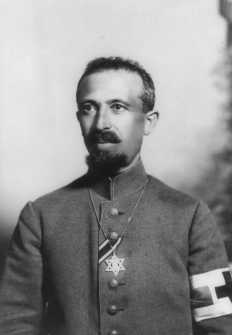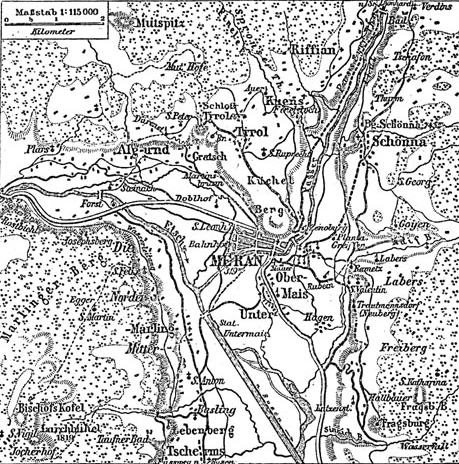|
Aaron Tänzer
Aaron Tänzer (german: Aron Tänzer, hu, Tänzer Áron; also german: Arnold Tänzer; January 30, 1871 – February 26, 1937, Göppingen) was a rabbi in Austria and Germany, chaplain and author. Biography He was born in Pressburg, Austria-Hungary (present day Bratislava, Slovakia). He studied at the Pressburg Yeshiva, and studied Oriental philology and history at the University of Berlin (PhD 1895). In 1896, he was called to Hohenems, Austria as chief rabbi of Tyrol and Vorarlberg; and from 1904 to 1907 he was rabbi of Meran (Tyrol). From 1907 until his death, he served as rabbi of the Jewish community of Göppingen in Württemberg, Germany. His history of the Jews of Göppingen and nearby Jebenhausen is notable as a thorough documentation of a Jewish community from its beginnings. In World War I, he served as a ''Feldrabbiner'' (Jewish chaplain) in the German army, primarily on the Eastern front. He looked after German and Austrian Jewish soldiers and took care of Jewish pr ... [...More Info...] [...Related Items...] OR: [Wikipedia] [Google] [Baidu] |
Bratislava
Bratislava (, also ; ; german: Preßburg/Pressburg ; hu, Pozsony) is the Capital city, capital and largest city of Slovakia. Officially, the population of the city is about 475,000; however, it is estimated to be more than 660,000 — approximately 140% of the official figures. Bratislava is in southwestern Slovakia at the foot of the Little Carpathians, occupying both banks of the River Danube and the left bank of the Morava (river), River Morava. Bordering Austria and Hungary, it is the only national capital that borders two sovereign states. The city's history has been influenced by people of many nations and religions, including Austrians, Bulgarians, Croats, Czechs, Germans, Hungarian people, Hungarians, Jews, Romani people, Romani, Serbs and Slovaks. It was the coronation site and legislative center and capital of the Kingdom of Hungary from 1536 to 1783; eleven King of Hungary, Hungarian kings and eight queens were crowned in St Martin's Cathedral, Bratislava, St Martin' ... [...More Info...] [...Related Items...] OR: [Wikipedia] [Google] [Baidu] |
Pressburg Yeshiva (Austria-Hungary)
The Pressburg Yeshiva, was the largest and most influential Yeshiva in Central Europe in the 19th century. It was founded in the city of Pressburg, Austrian Empire (today Bratislava, Slovakia) by Rabbi Moshe Sofer (known as the ''Chasam Sofer'' or ''Chatam Sofer'' ) and was considered the largest Yeshiva since the time of the Babylonian Talmud. Leadership Rabbi Moshe Sofer (Chassam Sofer) Some sources document its establishment in 1803 whilst others cite 1806. The Yeshiva was known as ''The Chassam Sofer Yeshiva'', or simply as ''Pressburg Yeshiva''. The Pressburg Yeshiva was run as an autonomous institution, without the intervention of the community.The Story of the Jewish Community in Bratislava - The Pressburg Yeshiva < ... [...More Info...] [...Related Items...] OR: [Wikipedia] [Google] [Baidu] |
1937 Deaths
Events January * January 1 – Anastasio Somoza García becomes President of Nicaragua. * January 5 – Water levels begin to rise in the Ohio River in the United States, leading to the Ohio River flood of 1937, which continues into February, leaving 1 million people homeless and 385 people dead. * January 15 – Spanish Civil War: Second Battle of the Corunna Road ends inconclusively. * January 20 – Second inauguration of Franklin D. Roosevelt: Franklin D. Roosevelt is sworn in for a second term as President of the United States. This is the first time that the United States presidential inauguration occurs on this date; the change is due to the ratification in 1933 of the Twentieth Amendment to the United States Constitution. * January 23 – Moscow Trials: Trial of the Anti-Soviet Trotskyist Center – In the Soviet Union 17 leading Communists go on trial, accused of participating in a plot led by Leon Trotsky to overthrow Joseph Stalin's regime, and assa ... [...More Info...] [...Related Items...] OR: [Wikipedia] [Google] [Baidu] |
1871 Births
Events January–March * January 3 – Franco-Prussian War – Battle of Bapaume: Prussians win a strategic victory. * January 18 – Proclamation of the German Empire: The member states of the North German Confederation and the south German states, aside from Austria, unite into a single nation state, known as the German Empire. The King of Prussia is declared the first German Emperor as Wilhelm I of Germany, in the Hall of Mirrors at the Palace of Versailles. Constitution of the German Confederation comes into effect. It abolishes all restrictions on Jewish marriage, choice of occupation, place of residence, and property ownership, but exclusion from government employment and discrimination in social relations remain in effect. * January 21 – Giuseppe Garibaldi's group of French and Italian volunteer troops, in support of the French Third Republic, win a battle against the Prussians in the Battle of Dijon. * February 8 – 1871 French legislative election elect ... [...More Info...] [...Related Items...] OR: [Wikipedia] [Google] [Baidu] |
Leo Baeck Institute, New York
The Leo Baeck Institute New York (LBI) is a research institute in New York City dedicated to the study of German-Jewish history and culture, founded in 1955. It is one of three independent research centers founded by a group of German-speaking Jewish émigrés at a conference in Jerusalem in 1955. The other Leo Baeck institutes are Leo Baeck Institute Jerusalem and Leo Baeck Institute London, and the activities of all three are coordinated by the board of directors of the Leo Baeck Institute. It is also a founding partner of the Center for Jewish History, and maintains a research library and archive in New York City that contains a significant collection of source material relating to the history of German-speaking Jewry, from its origins to the Holocaust, and continuing to the present day. The Leo Baeck Medal has been awarded by the institute since 1978 to those who have helped preserve the spirit of German-speaking Jewry in culture, academia, politics, and philanthropy. Hist ... [...More Info...] [...Related Items...] OR: [Wikipedia] [Google] [Baidu] |
Isidore Singer
Isidore Singer (10 November 1859 – 20 February 1939) was an American encyclopedist and editor of ''The Jewish Encyclopedia'' and founder of the American League for the Rights of Man. Biography Singer was born in 1859 in Weisskirchen, Moravia, in the Austrian Empire. He studied at the University of Vienna and the Humboldt University of Berlin, receiving his Ph.D. in 1884. France After editing the ''Allgemeine oesterreichische Literaturzeitung'' (Austrian literary newspaper) from 1885 to 1886, he became literary secretary to the French ambassador in Vienna. From 1887, he worked in Paris in the press bureau of the French foreign office and was active in the campaign on behalf of Alfred Dreyfus. In 1893 he founded a short-lived biweekly called ''La Vraie Parole'' as a foil to the anti-Jewish ''La Libre Parole''. New York Singer moved to New York City in 1895 where he learned English and taught French, raising the money for the ''Jewish Encyclopedia'' he had envisioned ... [...More Info...] [...Related Items...] OR: [Wikipedia] [Google] [Baidu] |
Dallgow-Döberitz
Dallgow-Döberitz is a municipality in the Havelland district, in Brandenburg, Germany. Geography It consists of the villages of Dallgow-Döberitz, Rohrbeck and Seeburg. To the east it shares border with the Spandau borough of Berlin. Neighbouring Brandenburg municipalities are Falkensee in the north and Wustermark in the west. In the south is the large former proving ground ''Döberitzer Heide'', now mainly a nature reserve governed by the Heinz Sielmann Foundation. Districts of Dallgow-Döberitz * Dallgow (with Neu-Döberitz) * Rohrbeck * Seeburg History The Imperial German Army established a proving ground in 1894 around the village of ''Döberitz'', which had to be abandoned by its inhabitants. Its pioneering airfield was, in late 1915, the place where the world's first practical all-metal aircraft, the Junkers J 1, made its pioneering flights. During the 1936 Summer Olympics in neighboring Berlin, it hosted the riding part of the modern pentathlon and part of the eq ... [...More Info...] [...Related Items...] OR: [Wikipedia] [Google] [Baidu] |
Merano
Merano (, , ) or Meran () is a city and ''comune'' in South Tyrol, northern Italy. Generally best known for its spa resorts, it is located within a basin, surrounded by mountains standing up to above sea level, at the entrance to the Passeier Valley and the Vinschgau. In the past, the city has been a popular place of residence for several scientists, literary people, and artists, including Franz Kafka, Ezra Pound, Paul Lazarsfeld, and also Empress Elisabeth of Austria, who appreciated its mild climate. Name Both the Italian () and the German () names for the city are used in English. The Ladin form of the name is . The official name of the municipality (''comune'') is ''Comune di Merano'' in Italian and ''Stadtgemeinde Meran'' in German (both are in official use). History In 17th-century Latin, the city was called ''Meranum''. Other archaic names are ''Mairania'' (from 857 AD) and ''an der Meran'' (from the 15th century). Origin The area has been inhabited since the third ... [...More Info...] [...Related Items...] OR: [Wikipedia] [Google] [Baidu] |
Vorarlberg
Vorarlberg ( , ; gsw, label=Vorarlbergisch, Vorarlbearg, , or ) is the westernmost States of Austria, state () of Austria. It has the second-smallest geographical area after Vienna and, although it also has the second-smallest population, it is the state with the second-highest population density (also after Vienna). It borders three countries: Germany (Bavaria and Baden-Württemberg via Lake Constance), Switzerland (Grisons and Canton of St. Gallen, St. Gallen), and Liechtenstein. The only Austrian state that shares a border with Vorarlberg is Tyrol (state), Tyrol, to the east. The capital of Vorarlberg is Bregenz (29,698 inhabitants), although Dornbirn (49,845 inhabitants) and Feldkirch, Vorarlberg, Feldkirch (34,192 inhabitants) have List of cities and towns in Austria, larger populations. Vorarlberg is also the only state in Austria in which the local dialect is not Austro-Bavarian dialects, Austro-Bavarian, but rather an Alemannic dialects, Alemannic dialect; it therefore ha ... [...More Info...] [...Related Items...] OR: [Wikipedia] [Google] [Baidu] |




_(LOC)_-_Flickr_-_The_Library_of_Congress.jpg)
.jpg)
.jpg)
